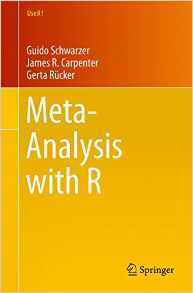Description
Meta-Analysis with R, 1st ed. 2015
Use R! Series
Authors: Schwarzer Guido, Carpenter James R., Rücker Gerta
Language: English
Subject for Meta-Analysis with R:
58.01 €
In Print (Delivery period: 15 days).
Add to cart252 p. · 15.5x23.5 cm · Paperback
Description
/li>Contents
/li>Biography
/li>Comment
/li>
This book provides a comprehensive introduction to performing meta-analysis using the statistical software R. It is intended for quantitative researchers and students in the medical and social sciences who wish to learn how to perform meta-analysis with R. As such, the book introduces the key concepts and models used in meta-analysis. It also includes chapters on the following advanced topics: publication bias and small study effects; missing data; multivariate meta-analysis, network meta-analysis; and meta-analysis of diagnostic studies.
Part I Getting Started: An Introduction to Meta-Analysis in R.- Part II Standard Methods: Fixed Effect and Random Effects Meta-Analysis.- Meta-Analysis with Binary Outcomes.- Heterogeneity and Meta-Regression.- Part III Advanced Topics: Small-Study Effects in Meta-Analysis.- Missing Data in Meta-Analysis.- Multivariate Meta-Analysis.- Network Meta-Analysis.- Meta-Analysis of Diagnostic Test Accuracy Studies.- Further Information on R.- Index.
Guido Schwarzer is a senior statistician and head of IT at the Institute for Medical Biometry and Statistics at the Medical Center - University of Freiburg, Germany. He is an established researcher in the area of meta-analysis and lead statistician of several Cochrane reviews. His special interests are in small-study effects in meta-analysis and statistical computing. Guido Schwarzer is an author of the R packages meta, metasens, and netmeta.
James Carpenter studied mathematics at Warwick University and statistics at Oxford University. His principal interests are coping with missing data in complex hierarchical models, sensitivity analysis and meta-analysis, with applications to medical and social data. The collaboration that led to this book began during a sabbatical at Freiburg in 2005–6. James Carpenter is Professor of Medical Statistics at the London School of Hygiene and Tropical Medicine, and Programme Leader in Methodology at the MRC Clinical Trials Unit,London.
Gerta Rücker is a mathematician, working at the Institute for Medical Biometry and Statistics at the Medical Center - University of Freiburg, Germany. After having published in chemical graph theory for a number of years, she started working in biostatistics, particularly meta-analysis. Her principal interests are small-study effects and heterogeneity in meta-analysis, meta-analysis of diagnostic accuracy studies and application of graph theory in network meta-analysis. She has published a large number of methodological research papers, co-authored a number of Cochrane reviews and is an author of the R package netmeta.




